- Home
- J. G. Ballard
Rushing to Paradise Page 6
Rushing to Paradise Read online
Page 6
‘Kimo tells me you want to swim across the Kaiwi Channel,’ Carline commented as they rested in the hold, surrounded by the engines and inflatables. ‘It’s a long way. Do you think you can do it?’
‘Maybe not. But it’s worth trying.’
‘Good for you. Now that’s no day-dreamer’s philosophy.
How do you feel about going back to Saint-Esprit?’
‘It’s dangerous…’ Neil said nothing of his decision to re main in Honolulu even if the Dugong sailed. ‘The French have patrol boats and a corvette.’
‘You’re wary, and it’s sensible of you. Remember, though, you weren’t
frightened to face that French bullet.’
‘I was running away.’ Carline laughed at this. ‘Well, at least you weren’t frightened to do that either.’ As he helped Carline to rope down the engines, it occurred to Neil that it would be surprisingly easy to sabotage the Dugong.
Captain Wu had talked to Boyd and Dr Barbara about their contingency plans if the trawler was hit by gun-fire: they uld either run her aground in the lagoon or scuttle her astri e the reef. The cargo-hold and engine-room seacocks were never guarded, and at night only the Saitos and the Filipino crew slept aboard the ship.
Canine returned with his wife to their Waikiki hotel, and Dr Barbara and Monique to their apartments in Honolulu. The quay was patrolled by a group of French students who had flown in from Tahiti, opposed to their government’s decision to end the moratorium on nuclear testing and suspicious of the treacheries of the Deuxi me
�
Bureau.
They sat around a kerosene lamp by the gangway, handing out leaflets to any midnight visitors who wandered down the quay, while a look out monitored the waters around the Dugong in a small dinghy.
The cabin that Neil would share with Canine and the Indian sound-recordist was a narrow steel box with three hinged bunks, barely six steps from the door into the forward hold. The Filipinos slept aft in the engine-room and would hear Neil if he approached, but a single open seacock would flood the Dugong and sink it to the harbour bed.
Neil watched the news bulletins at his rooming house, waiting for the French intelligence agents in Honolulu to carry out the same act of sabotage that had sunk the Rainbow Warrior, and so save him the pain of betraying Dr Barbara. At the end ofJune, a week before the Dugong’s departure for Saint-Esprit, he packed a travel case with enough clothing and personal tackle to convince anyone that he meant to live aboard the ship.
He arrived at the quay by dusk, as the French volunteers sat in their deck-chairs beside the gangway, their anti-nuclear banners swaying in the riding lights of the ship. Neil stowed his bag in the cabin and tested the unlocked door into the forward hold. He joined Professor Saito and his wife in the galley, where he shared their modest macrobiotic meal. Afterwards they invited him to their cabin, where they earnestly discussed the damage to Japan’s wild-life by the post-war policy of industrialization at any cost.
A dedicated taxonomist, Professor Saito was a slim, unsmiling man who seemed barely older than Neil. The cabin was crammed with textbooks and research reports on the world’s myriad endangered species, which the botanist seemed to be clas ing single-handedly. He had begun to catalogue the insect life Yard the Dugong, and had even noticed a fall in the expected number of rats in the bilges.
Mrs Saito was a small, brisk woman with strong hands that almost pulled Neil’s wrists out of joint when she greeted him.
She was devoted to her husband, forever watching him like an experienced manager supervising a novice boxer. Through the flicker of her chopsticks she stared at Neil’s skin, once reaching out to touch his arm as if she expected to see his radiation burns.
She told him that they travelled to Saint-Esprit as the delegates of all the nuclear casualties of World War II.
‘We can save the albatross, Neil,’ she assured him.
‘Of course we can, Mrs Saito,’ Neil replied, uncertain whether her remark was a question.
‘If we save the albatross we can help the spirit of many people in Hiroshima.’
‘The dead people?’
‘And the other people today. They live on in the albatross.’ Her husband sucked at his sake. ‘It’s England’s sacred bird?’ he asked. ‘A totemic figure?’
‘Yes, it is, in a way..
‘It’s a beautiful bird. Is Saint-Esprit beautiful?’
‘It certainly is,’ Neil assured him. ‘It has a very strange atmosphere, you know. There are all these amazing towers.’
‘Towers?’ Professor Saito sat up. ‘Like… obelisks? Stone columns, with religious inscriptions?’
‘No. Camera-towers, made of concrete. Waiting for a nuclear explosion..
Neil tried to calm himself, but the silence that followed his brief outburst lasted until he left the cabin and closed the door on the Saitos. He spent the next two hours on the quay, talking to an earnest American woman, a computer sciences major at the University, who prepared coffee for the French students. At midnight he climbed the gangway and went to his cabin. He sat by the open door, listening to the strange scratching sounds that emerged from the Saitos’ cabin, and watched the distant lights of Waikiki through the salt-smeared porthole.
For the first time he wondered if he had the courage to turn the seacock and sink Dr Barbara’s dreams to the harbour btom.
Even a few feet of water in the forward hold would postpone their departure long enough for Irving Boyd to have second thoughts about the voyage.
The students were drowsing in their deck-chairs, and the scent of cannabis drifted over the silent ship. Neil stepped from the cabin and eased open the door into the hold. As he turned the wheel of the seacock he vowed to work hard for Dr Barbara and somehow reinstate her as a practising physician.
Headlights flared across the hatchway above his head, illuminating the foremast which reared into the night like a crippled gallows. As the Saitos stirred in their cabin, Neil climbed the oily ladder to the deck and crouched behind the satellite dish. The students were shouting to each other and there was a panic of running feet on the gangway. A taxi approached at speed along the quay, its beams dipping and flaring as the driver braked beside the moored craft, searching for the Dugong. Dr Barbara leaned over his shoulder, pointing to the white wings that veered from the dark water.
Seeing her, Neil felt a surge of relief. He knew that he could sink the ship, but not while Dr Barbara walked its bridge. He met her on the gangway, taking her hands when she stumbled towards the deck. Her hair was uncombed, and she gasped through her smeared lipstick, as if she had just been embraced by a violent lover.
‘Neil, thank God you’re here. I knew I could rely on you.’
‘Dr Barbara? What is it—did someone attack you?’
‘They’ve attacked all of us!’ Dr Barbara stared wildly at the ship, as if unable to focus her eyes. ‘The French have informed the United Nations. Nuclear tests resume at Saint-Esprit on July i. Neil!’
‘July is…?’ Neil tried to restrain her whirling hands, moving across the night air like deranged birds. ‘Dr Barbara, that means there’s no point in going.
We’ll never get there.’
‘We will, Neil. If we leave tomorrow.’ She clasped him in her fierce arms, forcing his cheek against her hot breast. ‘Think of it, Neil - they’re setting off a nuclear bomb. You’ll have to come with me now…’ 4 The Shore Raid An elaborate air-and-sea ballet was taking place, an over rehearsed performance that rarely deviated from its agreed scenario. The sombre stage-set, of Saint-Esprit rose in the background, a thundercloud sitting like a disgruntled genie on its peak, underskirts lit by the ceaseless flurry of the surf against the beaches of black ash. The sea shifted, its surface criss-crossed by a maze of wakes, a frantic choreography marking the thrusts and counter-thrusts of the daily confrontation.
Legs braced against the rolling bows, Neil stood on the foredeck of the Dugong, shielded from the cold spray by the white bowl of the satellite dish
, at that moment transmitting the afternoon’s first performance to the watching world.
The only element missing, he often reflected, was a floating orchestra and chorus on a ceremonial barge above the reef. Driven by Kimo and David Carline, the two inflatables swerved across the bows of the Champlain as the French supply vessel manoeuvred on the sliding sea outside the entrance to the reef. Powered by their violent outboards, the inflatables leapt almost vertically through the spray, albatross flashes baiting the weary captain as he once again signalled astern to his engine-room.
For an hour the Champlain had been trying to enter the lagoon, and Neil assumed that the captain was under orders not to run down the two inflatables doing
their best to provoke him. He released smoke, which the two-seater helicopter overhead fanned into a sooty haze, trying to lure the soft-hulled craft onto the reef. Kimo and Carline turned on their propellers with a flourish, charioteers leaping through a curtain of stage-smoke. They sped past the Dugong for an admiring cheer, led by Dr Barbara from the bridge, and raced back to the supply vessel.
But by now the French captain had lost his chance to enter the reef.
Reversing his engines, he moved across the swell, ignoring the inflatables while the helicopter came over to buzz the Dugong.
Neil gripped the cradle spars of the satellite dish, the machete in his right hand raised for the benefit of the Bracewells’ camera, with which the pilot had been trying to lasso the steel bowl.
The downdraught beat against Neil’s face, pummelling his skin and almost stripping the albatross-emblazoned windcheater: om his shoulders. Standing on the bridge behind Captain Wu, lark Bracewell fixed his lens on the circling aircraft, arms eadied by his wife as the sound-man, Pratap, fished the sky vith his boom microphone for the ugliest engine snarls. Beside cm, Monique swore and railed at the blond-haired pilot, her irest threats against the young man lost in the din.
She set off a)loured flare, which soared into the helicopter’s wake as it made weary sweep of the disturbed sea and set off for the landing on Saint-Esprit. on there would be an hour’s intermission, giving the world-wide television audience time to refocus its indignation.
When Janet Bracewell called to Neil he turned to face the camera, ware that his chief role was to provide a poignant end-credit to transmissions. He hoped that Louise, watching the evening cws in England after a day at her music school, would see him id at least appreciate the finer points of the afternoon’s display, d that his mother, sitting on the edge of her chair in Atlanta, id not be too alarmed by the vicious blade in his hand.
Vain Wu waited beside the Filipino helmsman, disapprov f these unseamanlike proceedings, while a breathless Dr irbara surveyed the churned sea like an impresario viewing the cation of a lavish film production. This, of course, was literally lie, but Dr Barbara, Neil and everyone aboard the Dugong iew that at any moment the good-humoured duel might come a brutal end. They all assumed that the planned nuclear tests iuld soon take place. Since their arrival at Saint-Esprit four ancient camera-towers and blockhouses of the atoll, half-hoping to see a mind-searing eruption of vapour rise from the centre of the lagoon.
Meanwhile, a single volley of shots from the Champlain would sink the inflatables and put them out of action for good. Yet so far, for whatever political and diplomatic reasons, the French had been sticking to the script. They allowed the Dugong to approach the island, and waited patiently as the inflatables performed their water-borne pas de deux. In the late afternoon the corvette Sagittaire would arrive and escort the trawler to the perimeter of the thirty-mile exclusionzone, its signal lamp signing off with a choice obscenity that sent Monique enraged to her cabin.
The arrangement suited everyone, and provided the maxi mum of national dignity and TV coverage at the minimum of risk. But now there would be a radical change to the script, and the French had not been consulted. As the deck rolled against his injured foot, testing the still tender nerves, Neil remembered the bullet that had struck him three months beforehand. If Dr Barbara seriously provoked them, the French would shoot again.
‘Neil, are you coming?’ Monique shouted to him from the bridge, as she fastened her life-jacket. ‘We’re leaving now.’
‘I’ll stay here, Monique.’
‘We want you on the island, Neil. It’s good for the film.’
‘You get shot for me.’
‘As you wish…’ Monique bared her large teeth, concerned that Neil had mislaid his courage with his boarding pass. ‘You should rest more, Neil. These nuclear dreams..
By the starboard gangway, hidden from the Champlain’s binoculars, rode one of
Irving Boyd’s most powerful speedboats, engine rumbling at the sea like an impatient bloodhound. Its seats were loaded with flares, detonators and three Molotov cocktails, which Carline and Professor Saito had assembled, using a brew of ether, palm oil and gasoline. Mrs Saito was already squatting among the glass cylinders, her hands fondling the tapers of cotton waste, excited by the destructive power at her finger-tips. Monique clambered into the craft, and silently mouthed some eco-catechism as she stared at the waiting beaches. The nuclear island incarnated everything these women feared and detested, as Neil knew from their long harangues.
Often they trapped him in the galley and threatened him with all the deformations that afflicted the placid turtles of Eniwetok Atoll, the holiest ground of Neil’s imagination.
A Filipino crewman calmed the speedboat’s engine as its spitting exhaust raked the white hull-plates of the Dugong.
Professor Saito, his slim face hidden inside the hood of his waterproof, crouched beside the Bracewells and Pratap. The Japanese botanist seemed pinched and nervous, never comfort able when he was more than a few feet from the journals and year-books in his cabin. Between his hands he clasped a terra-otta jar of human ashes, a small sample entrusted to him by the Icepers of a Hiroshima ossuary, which he hoped to bury beside dead albatross on the quiet sands of the Saint-Esprit lagoon.
Relieved that he had refused to join Dr Barbara on this shore Neil waited for her to emerge from the bridge-house. She epped onto the deck, trussed like a weekend commando into life-jacket and waterproof, and gave a brave wave to Neil.
He helped her down the gangway towards the pitching speed oat, trying to steady her shaking feet, but she stumbled on the reasy steps, almost losing the albatross bandeau around her head.
Dr Barbara, why don’t we—?’
‘what is it?’ Regaining her balance, she turned her nest smile on him, one arm raised to fend the swaying hull rtie Dugong from his head. ‘Don’t be frightened by all this.’
‘We could wait another day - or even a week. The French might leave.’
‘We can’t wait any longer, Neil. We must set foot on the land. If we don’t, the world will lose interest in us. Now, I ant you to stay on board. You’ve done enough to save the -ross. Promise me you won’t try to swim ashore.’ r Barbara… ‘
Neil pointed to the Molotov cocktail led between Mrs S alto’s thighs. ‘Just one bullet - that’s all it:eds to blow up the boat. The Saitos haven’t seen the French.’ Dr Barbara tapped his chin with her fist. ‘We’ve got to get Shore. In ten days we have to go back to Honolulu, and we need!11Cthin to show lrviii we’re serious.’
‘But Irving isn’t serious!’ Neil found himself shouting through the Champlain’s sirens. ‘All this is just a TV programme for him…’
‘I know, Neil. But this is our last chance. Trust me..
Its wake boiling the sea, the speedboat moved away from the Dugong, the raiding party crouched behind the helmsman. The two inflatables still worked like terriers around the supply ship, their outboards moaning. The Champlain had drifted through the confused sea, and now lay five hundred yards from the reef entrance.
The captain defended his bows, and his crewmen aimed their hoses at Carline and Kimo when they swerved and turned, drenching the two men. No-one noticed the speedboat heading along the outer edge of the reef, where Kimo had
found a second breach in the coral wall.
Should he swim ashore? Neil gripped the handrail and gazed at the eager waves, rolling playfully onto their backs as they waited for him. He guessed that Dr Barbara had dropped the idea like a small pebble into his mind, keen to have Neil with the raiding party but unwilling to be responsible for him. This time, she knew, the French would aim higher than Neil’s feet.
As their tempers rose they had resorted to tougher tactics.
Escorting them out of the exclusion zone, the Sagittaire had almost rammed the trawler. The officer in charge of the board ing party physically threatened
Captain Wu, and his NCOs had manhandled Kimo, silencing Dr Barbara and Monique with their loudhailers when they tried to make an impassioned speech to the Bracewells’
camera.
All this they were fully prepared for, and during the voyage from Honolulu they felt surprisingly lightheaded, their spirits kept buoyant by Dr Barbara’s steadfast conviction that their mission to the nuclear island would succeed.
Engine failure becalmed them for three days, a purgatory of airless boredom broken only by squalls of burning rain. Dr Barbara spent hours in the Dugong’s bows, counting the sea-birds, while Monique played bridge with Carline and the Bracewells. Kimo, strength ening his huge body for the confrontations ahead, ran endless 6i ircuits of the deck and exercised to a heavy rock beat on his ortable sound system.
The Saitos, meanwhile, rested in their cabin and honed their noral convictions.
Dropping in for a chat, which he knew nnoyed them, Neil was soon informed of their belief that the)ther members of the expedition lacked a proper understanding of heir journey to a spiritual ground-zero of the twentieth century.
Professor Saito tried to quiz Neil about the special symbolism of the albatross, viewing the bird as an emblem of the nuclear guilt that ailed Dr Barbara and, by extension, the wartime Americans.

 High-Rise
High-Rise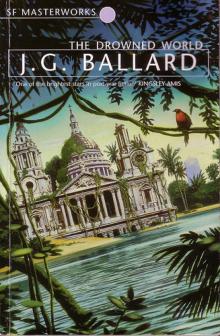 The Drowned World
The Drowned World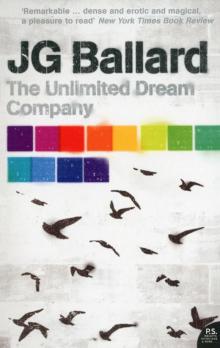 The Unlimited Dream Company
The Unlimited Dream Company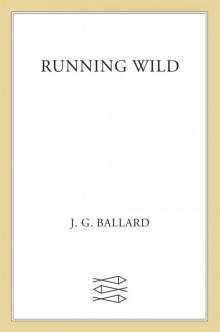 Running Wild
Running Wild The Day of Creation
The Day of Creation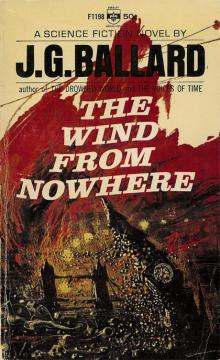 The Wind From Nowhere
The Wind From Nowhere The Complete Short Stories, Volume 2
The Complete Short Stories, Volume 2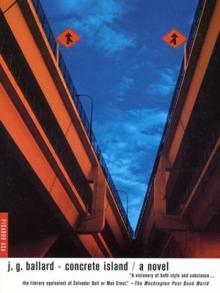 Concrete Island
Concrete Island Empire of the Sun
Empire of the Sun The Kindness of Women
The Kindness of Women Vermilion Sands
Vermilion Sands Super-Cannes
Super-Cannes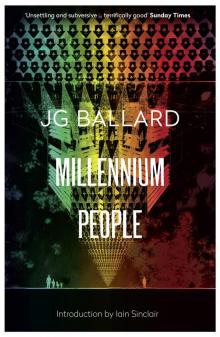 Millennium People
Millennium People The Complete Stories of J. G. Ballard
The Complete Stories of J. G. Ballard Crash
Crash The Drought
The Drought The Atrocity Exhibition
The Atrocity Exhibition The Complete Short Stories: Volume 1
The Complete Short Stories: Volume 1 Miracles of Life: Shanghai to Shepperton: An Autobiography
Miracles of Life: Shanghai to Shepperton: An Autobiography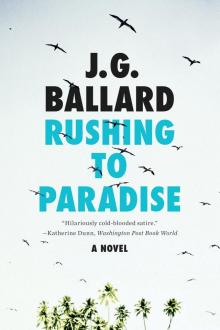 Rushing to Paradise
Rushing to Paradise Chronopolis
Chronopolis Cocaine Nights
Cocaine Nights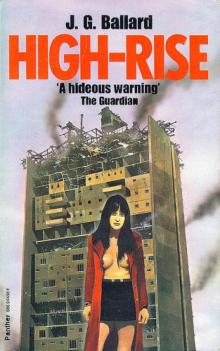 High Rise (1987)
High Rise (1987) The Complete Short Stories
The Complete Short Stories The Day of Creation (Harper Perennial Modern Classics)
The Day of Creation (Harper Perennial Modern Classics) The Crystal World
The Crystal World